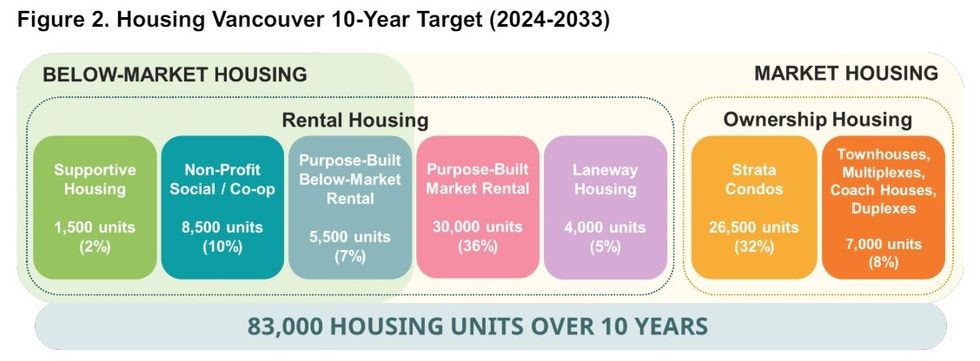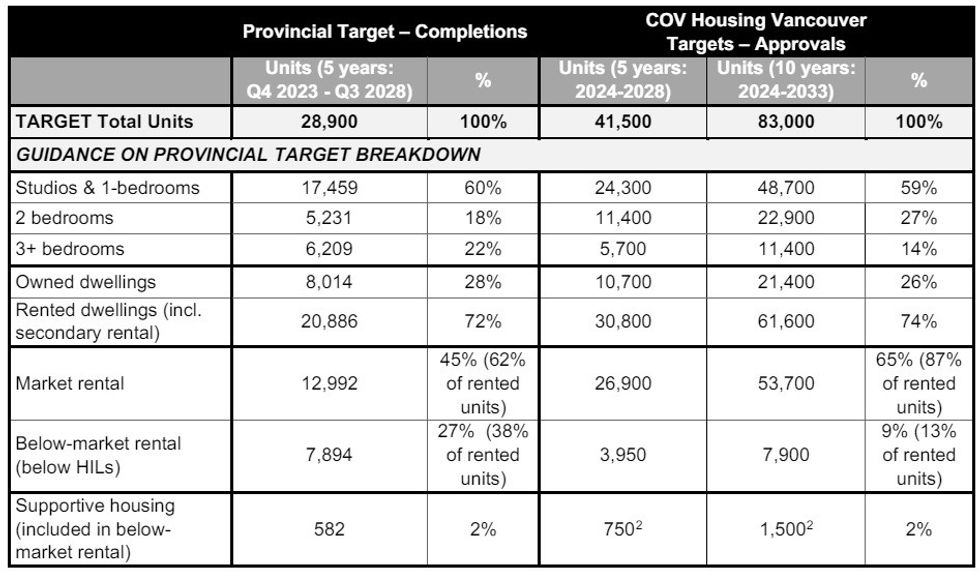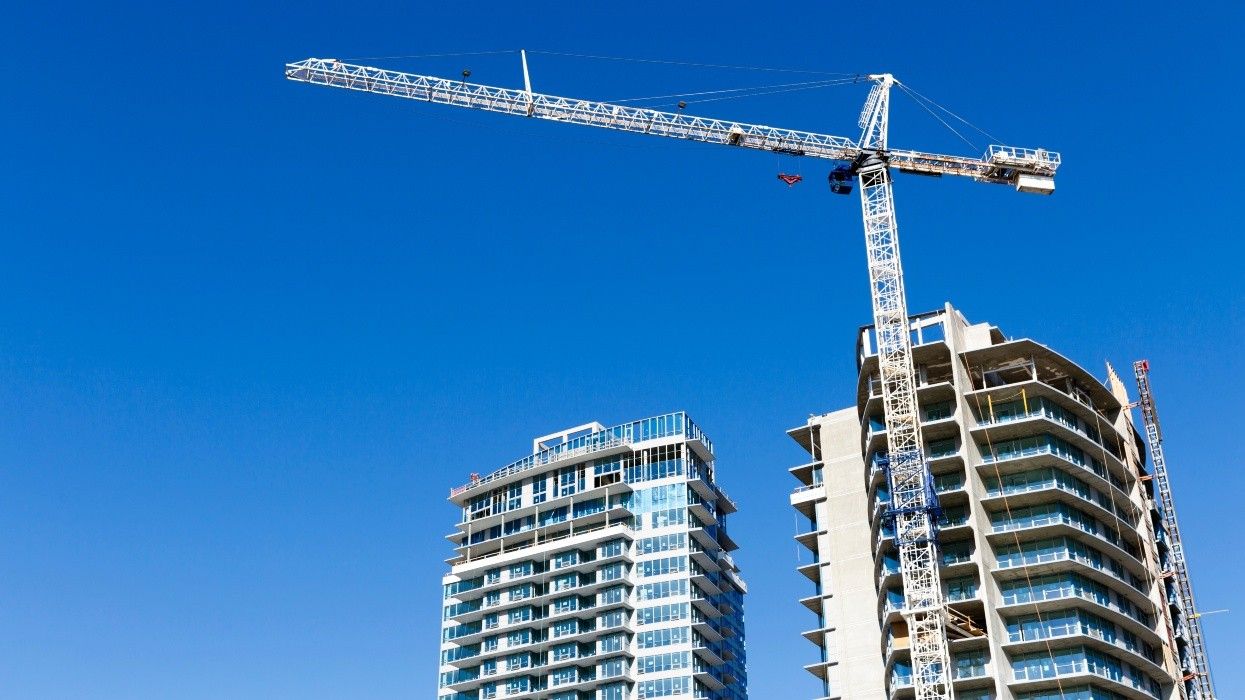On the heels of being given a housing supply target by the Province, the City of Vancouver is set to update its own housing supply targets, as well as an action plan towards reaching those targets.
In 2017, under then-Mayor Kennedy Stewart, the City approved the Housing Vancouver Strategy, which set a 10-year target of 72,000 new homes, with a focus on shifting towards the "right supply" — rental and affordable.
Now, the City is proposing a 10-year target of 83,000 new homes for the period of 2024 to 2033, which represents a 15% increase over the 2017 target.
Similar to 2017, the overall target is comprised of several sub-targets. Of the 83,000 new units, the City is aiming for:
- 30,000 purpose-built market rental units;
- 26,500 strata condominium units;
- 8,500 non-profit social housing / co-op units;
- 7,000 townhouses, duplexes, and multiplexes.
- 5,500 purpose-built below-market units;
- 4,000 laneway homes; and
- 1,500 supportive housing units.
As a whole, the City is aiming for 61,600 units (nearly 75% of the overall target) to be rental units, inclusive of secondary rental units, which are often strata condominiums purchased by investors who then rent them out. Of the 61,600 rental units, 15,500 units — supportive, non-profit, co-op — is the target for below-market units.
Additionally, of the overall 83,000, the City is aiming for 33,400 (40%) family-size units and 11,000 (13%) low-density units, such as laneway houses or multiplexes.

The updated targets are a reflection of "population growth, existing housing needs, and new Provincial requirements," said City staff in a council report that will be considered by Council on Tuesday.
Last fall, as part of the newly-introduced Housing Supply Act, the Province issued Vancouver a five-year Housing Target Order (HTO) of 28,900 units. As of March 31, 2024, the halfway point of the first year that ends on September 30, the City has hit just 30.1% of the 5,202 target for the first year. Along with annual targets, the Province also includes unit targets based on tenure, affordability, and unit size, although they are not official requirements.
Of note, however, is that the Province's targets are based on completions, while the City of Vancouver's targets are based on approvals, which means the City must set its targets at a higher number than the Province, since not all approved units get completed.
Comparing the City's targets to the Province's targets, the City's targets are at, or exceed, as a proportion of the total target, those of the Province in all categories except for below-market rental units and three-bedroom units, as a result of market conditions and development trends, respectively.
"While the City is able to significantly increase ownership and market rental housing options, meeting the full need for moderate- and low-income households seeking more affordable housing is not possible with municipal tools alone," said staff. "In today's context of rising costs and higher interest rates, delivering housing for moderate- and low-income households is the most challenging. The new Housing Vancouver Targets propose a total of 10,000 social and supportive housing units over 10 years, as well as 5,500 below-market rental units to be delivered by the private market, which will address about 25% of the need identified in the City's housing needs assessment. Although this will not meet the full need, it is an ambitious target based on development trends and financial analysis, and is achievable with support from senior government, non-profit, and private industry partners."
Regarding three-bedroom units, the City says that it will not be able to meet the 22% the Province has recommended, but can get to 14% based on current housing development trends.
"Engagement with industry and multiple rounds of economic testing have shown that increasing the number of 3-bedrooms, especially in rental buildings, significantly impacts project viability," City staff said.

Although City staff does not directly state it in their report, they also hint that the Province's current targets are essentially meaningless as a result of it being based on completions for a five-year period.
"Due to the 5-year timeframe of the Provincial target that uses completions as a measure, most multi-family projects expected to complete within the next 5 years have already been approved, are under construction, or going through the application process," staff said. "A portion of new approvals under the City’s new 10-year housing targets may result in completions during this first Provincial Target cycle, but will most likely result in completions counted in the subsequent Provincial Target cycle."
The 3 Year Housing Action Plan
To meet these new targets, staff have put together an action plan for the next three years, comprised of 50 actions that take advantage of "all of the City's roles in housing, including regulating land-use, capital and City-owned land investments in affordable housing, and partnerships and advocacy work."
The action plan is guided by three major principles — reconciliation, equity, and resilience — and seven key policy areas. Those policy areas and some key actions include:
1. Housing Need
- A seniors housing strategy;
- Setting housing targets on City-owned land; and
- Enabling more student housing.
- Simplifying apartment district schedules;
- Introducing a city-wide development guide; and
- Implementing the 25 village areas identified in the Vancouver Plan.
3. Addressing Homelessness
- Working with the Province on a SRO Intergovernmental Investment Strategy;
- Expanding shelter capacity; and
- Delivering more supportive housing in partnership with senior governments.
4. Community Housing
- Proactively zoning for social and co-operative housing;
- Exploring opportunities to support building acquisitions by non-profits; and
- Advancing new projects on City-owned land.
5. Indigenous Housing
- Progress the Jericho Lands project to Phase One rezoning;
- Implement actions identified in the UNDRIP Strategy; and
- Initiate new projects on City-owned sites.
6. Rental Housing
- Streamlining delivery with pre-approved plans;
- Retrofitting existing buildings;
- Exploring options to expand tenant protections.
7. Speculation
- Continuing to regulate short-term rental operators enforcement challenges;
- Monitoring the effectiveness of the Empty Homes Tax; and
- Continuing to establish the Development Contribution Expectations Policy to limit land speculation.
Council is set to approve the updated Housing Vancouver Strategy 10-year targets and the action plan on Tuesday, as well as a newly-proposed Rental Housing on City-land – Public Benefits Pilot Rezoning Policy that would exempt five rezoning applications from community amenity contributions (CACs) if the projects are designed to provide the City non-tax revenue, which the City hopes will allow it move away from CACs.
- Vancouver Outlines Housing Requirements In New TOA Rezoning Policy ›
- Josh White On Becoming Vancouver's New GM Of Planning ›
- BC Gov Issues Housing Supply Targets For 10 More Municipalities ›
- City of Vancouver Unveils First-Ever Seniors Housing Strategy ›
- Ten More BC Municipalities Receive Housing Supply Targets ›




















